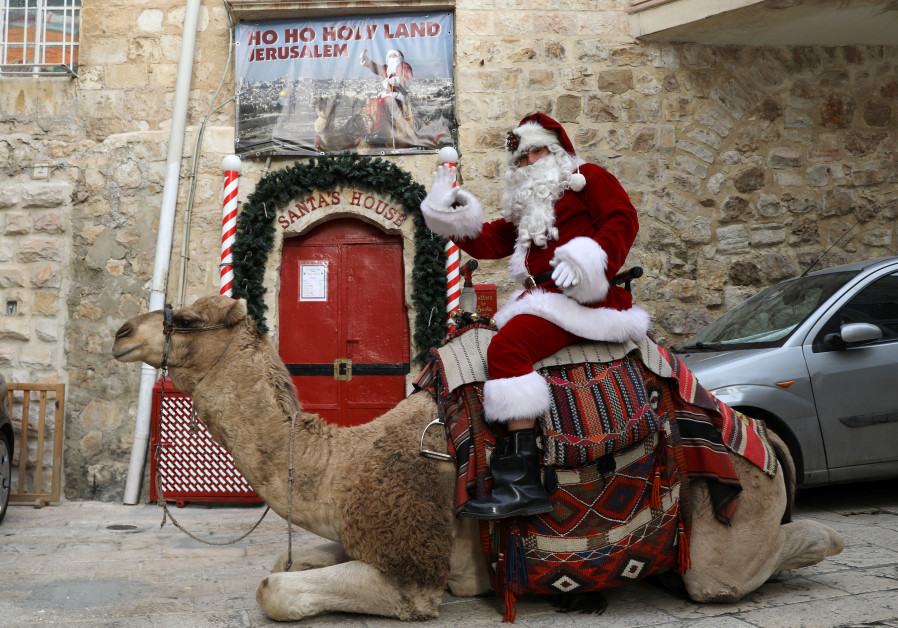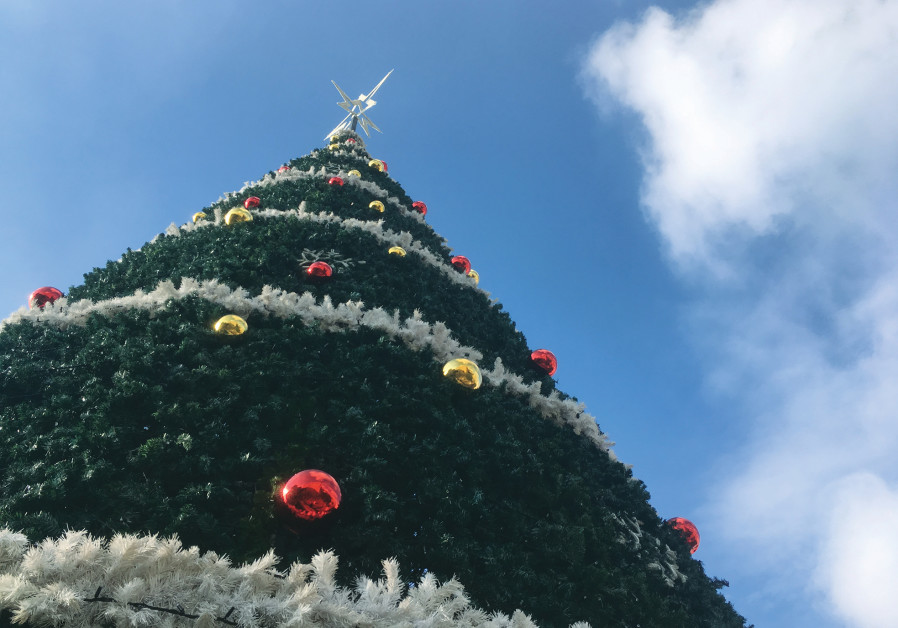“After we came out with the idea of a tree, the local council came out with the idea of a Christmas market,” Father Michael Assi said.

Amid Operation Northern Shield, the border of Lebanon might not be the ideal tourist destination, unless you’re looking to celebrate Christmas. From December 27-29, the village of Fassuta will hold its annual Christmas festival, called Christmas-Suta, a combination of the holiday and the village’s name.
“After we came out with the idea of a tree, the local council came out with the idea of a Christmas market,” Father Michael Assi, of the Mar Elias Church, said.
The village of Fassuta straddles the blue line – the UN-demarcated border between Israel and Lebanon – on the northwest slopes of Mount Meron. It is a local council of some 3,400 residents, all of whom are Melkite Greek Catholics. The town has, since 2013, set its sights on becoming a hub for Christian tourism.
Boasting “the biggest [tree] in Israel,” Assi described the anticipation for this year’s event. “Year after year, people are waiting for our event, they come from Beit Jala, Bethlehem, and Beit Sahur.”
Some 60,000 people came to Fassuta in 2017 for the festival, which included a Christmas market where merchants sold local seasonal foods, drinks, hand-made crafts, and which featured an exhibition on tradition and heritage. The huge synthetic tree cost NIS 100,000 ($26,500) and was sponsored by the Mar Elias Church.

“We thought that Christmas was a good way to attract tourists,” Reem Francis, a representative of the local council said.
The idea started in 2013 with just a Christmas market. Jews, Muslims and Christians came from the surrounding villages and asked, “What’s next year?”
The concept grew and by 2015 there was a three-day event in which 25,000 people, including some tourists from abroad, came from across Israel.
“We don’t have many attractions here,” Assi said of Fassuta. “We have a very small village, not like a city. We have our church, the local council, and we have an elementary school. We have three or four medical clinics, and we have the post office. That’s it!”
In 2017, Israel welcomed 3.6 million tourists, 54% of whom were Christian and some 900,000 who came on religious pilgrimages, according to the Tourism Ministry.
When asked if the council was worried that tensions on the Lebanon border might disrupt the festivities, Francis told The Jerusalem Post that it should not be an issue. However, he added, the local council is working closely with the Israel Police, in case a disruption should occur.
There is another attraction in Fassuta: a locally self-funded community center called Beit Rima. Rima Khoury turned her grandfather’s house, one of the oldest in the neighborhood, into a place where people can come together. “‘Beit’ means house, but it becomes a home,” Khoury said, “a home for everyone in Fassuta, specifically for people in our community, but also a home for everyone who arrives in Fassuta.”
Khoury struggled to become a fashion designer because it wasn’t what her community or parents expected of her. This experience encouraged her to give back to her community and provide a place for the youth of the village to express and cultivate their artistic abilities.
SHE WANTED to create a place for residents “to live, to thrive, and to be loved in.”
The back of the home houses a gallery of her art as well as others of the village. Khoury is even trying to connect some of her more talented students to art galleries in Tel Aviv and Haifa.
Beit Rima isn’t officially part of the festival, but in 2017 the house was opened to any guests interested in visiting during the festival. Overwhelmed by last year’s response, this year, Khoury’s center will only be opened to those who schedule a visit.
As of now, the city council isn’t looking to include Beit Rima in the festivities, but Khoury is hopeful the two entities will collaborate in the future.
Khoury’s Beit Rima has also become a place for coexistence. She regularly hosts get-togethers for Jewish and Christian women to talk and learn from one another.
Christianity is a big part of the Fassuta atmosphere, with Christmas lights decorating the town. It may also be the only Israeli city with Christian statues adorning roundabouts and town squares. Assi estimates that 70% of villagers attend church services or participate in rituals regularly.
While the town is rather homogeneous, its residents have a “complex identity.”
“We are Roman Catholics. We are Arabs, but not Muslims. We are Israelis, but not Jews,” Assi explained.
“We consider ourselves citizens of the state, we live peacefully,” added Fassuta resident Munir Najjar.
However, many residents who are Israeli citizens are disturbed by the recent Nation-State Law.
“I want the state to go back to that of Ben-Gurion. This state should be equal to all,” Najjar said, “even if the majority is Jewish.”
Najjar, the first Israeli-Arab registered tour guide, described the origins of Fassuta residents and the town’s history.
Most residents of the village have their origins in Lebanon and Syrian from about 500 years ago.
The area was ruled by Greeks, Romans, Crusaders, and later, by the Ottomans.
Muslims also used to live in the area, but left in 1948 out of fear of the encroaching, soon-to-be Israeli Army. Christians who were living in the area ran away as well, but returned to their homes a week later, unlike neighboring Arabs who were not allowed to return, such as the residents of Kafr Bir’am.
Today, Fassuta has one of the highest standards of living among Arab villages. On a scale from one to 10, where most wealthy areas are Jewish and rate a nine or 10 on the scale, Fassuta scores a six.
Fassuta attributes its success to its high percentage of educated residents.
“Our academic degrees are really our source of income,” Assi said.
The level of education for Christians is extremely high in Israel; 64% of Christians have an Israeli diploma, compared to 59% of Jewish Israelis and 48% of Muslims.
Fassuta’s history and its growing Christmas festivities are putting this small town on the map.
As reported by The Jerusalem Post
